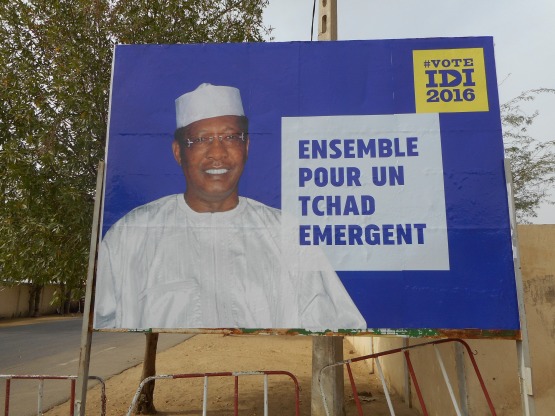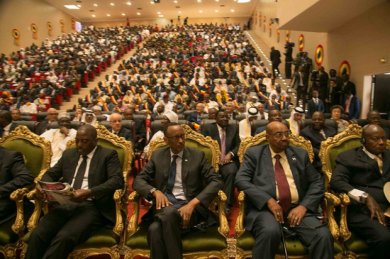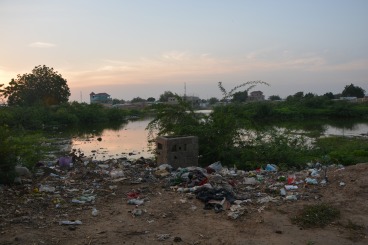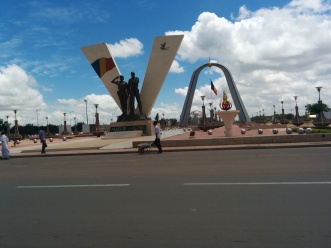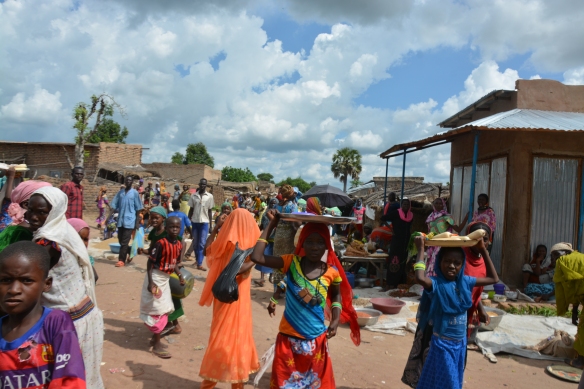
Roro: a market where three countries meet @Mirjam (2017)
The taxi driver who brings us back to Sarh from Kyabe is a young man. He wears the signs of his family on his face. He is Sara-Kabba, an ethnic group that has its main living space around Lac Iro in Central Chad. He shares a story with us: He once searched adventure in Yaoundé, Cameroon. He went without a coin in his pocket and was wandering the streets of Yaoundé when a person talked to him, asking where he came from, pointing at his scars. They were from the same region and same ethnic group, brothers. Hence he found his place to stay. You see, ‘les cicatrices, c’est notre passeport’. But he adds that this is also the past. It has not much meaning today.
Forgotten cultures
We are travelling to Southern Chad, through Moundou, Sarh to Kyabe and final destination Roro, the region of Lac Iro. We enter a forgotten land, not flooded by NGOs, where the state’s social services are almost absent. The few health centers that we see are equipped by religious missions of various denominations. There is one ethnographic work on the region, written by Claude Pairault (1923-2003)° and based on research done in the 1960s.
During our trip we meet Yaya Sarria, a dancer from Chad. He is travelling the region for a month to find out about songs and dances that are at risk of being forgotten. ‘All artists should know this’, he exclaims. We listen to the songs he and his friend gathered: beautiful stories told on rhyme, women singing at funerals, and so much more. Almost everything they have recorded is the art of old people. Young people do not learn these songs any longer. They also recorded interviews with people who relate about their traditions and lifestyles that are in danger as a consequence of subsequent wars and new religious forms.
Loss of resources
Southern Chad has been suffering – like all other parts of the country – from more and less intensive periods of wars and rebellions. The main heritage is non-development. Conflict and war eat resources that are hence not invested in the country for infrastructure or other purposes. The exploitation of oil during the past decade did not
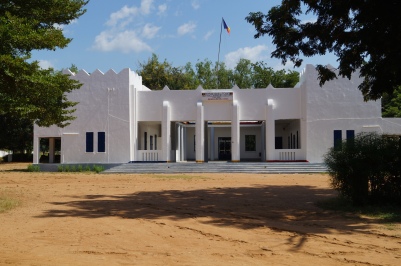
A ministry building in Sarh, renewed colonial building @Mirjam (2013)
change much, apparently. Even though the road from Moundou to Kyabe was built by means of oil money, after Kyabe the road stops altogether and, so it seems, all other things we see as modernity as well. The recent developments in the region can be summarized around issues of land and refugees, partly the result of conflicts in neighbouring countries. Add to this the kleptocratic character of the state’s ruling clan and the recent crisis that has hit Chad and one can imagine that the relative stability of the past ten years, including the oil money, has not changed much to the conditions of the people in this region.
However, the market in Roro is a space of encounters, here the three countries (Sudan, CAR and Chad) meet and the people from the region come to sell their cattle, food, and Kalashnikovs. It is an impressive market. Roro is a far-away place for those who come from N’Djamena, the capital of Chad, but a central place in the region. It’s also a place where the government receives a lot of tax income, but these revenues cannot stay in Roro, as it depends on Kyabe, the district capital, where the money goes to. The money flows somewhere but not back into this region.
Identity and belonging
How does the population in this region relate to recent history? What are their points of reference? Where do they belong to? In a recent study Souleymane Adoum a Chadian historian, explains about the lack of archives in this region. All archives in Sarh-region have disappeared in fires or pillage or have simply been destroyed by the rains in the dilapidated houses. During the various rebellions people were also forced to abandon their ‘modern’ objects, as those objects did not fit the rebellions’ anti-Western ideology, hence all letters and pictures or other objects that are reminiscent of personal histories are gone. For his research Souleymane depended almost completely on oral histories and life stories.
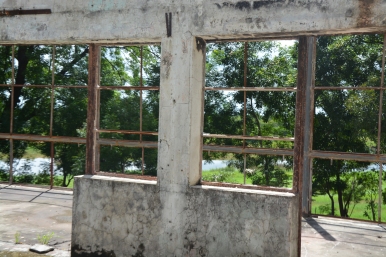
Cailcidrat, colonial trees through the ruine of Hôtel de Chasse @Mirjam (2017
In Sarh we come across a small museum. It has no money to buy objects. Hotel deChasse, a colonial legacy, was burned down ten years ago – an accident. However, the state did restore the colonial buildings in this town. It seems a strange contrast to me that the colonial legacy is conserved, while the region just outside Sarh is lacking all social services. The museum could have been an important point of reference for young and old people to discover their identity. But it is visited only rarely and contains so little objects that it feels as if the country has no history nor memory.
Chinese art
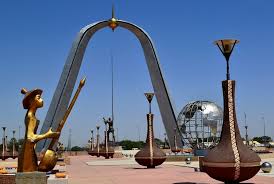
Place de la nation: N’Djamena (internet picture)
What then is the orientation for the youth? The ethnic markers? As the young taxi driver continues, referring to his scars: ‘These are now remnants of the past. We no longer do this; things are changing’. Many people from the region Sarh now live in N’Djamena. The search for a little income cracks up most youth; the university is on strike all the time, surviving in the city is difficult. The image they develop of the world is a polarized one, due to differences with Europe and the USA but especially due to the differences within their own country: between the rich who flourish well and the poor who are denied a normal subsistence. The president promised a ‘renaissance’, but this is only captured in symbols created by Chinese artists, such as the Place de la Nation in N’Djamena, or in the restauration of colonial remnants in Sarh. Are these really meant as new symbols of identity? In Chad people cannot choose their own symbols of belonging. Their symbols of history and identity have disappeared and the replacements are empty.
Yaya Sarria’s art project should be continued!

